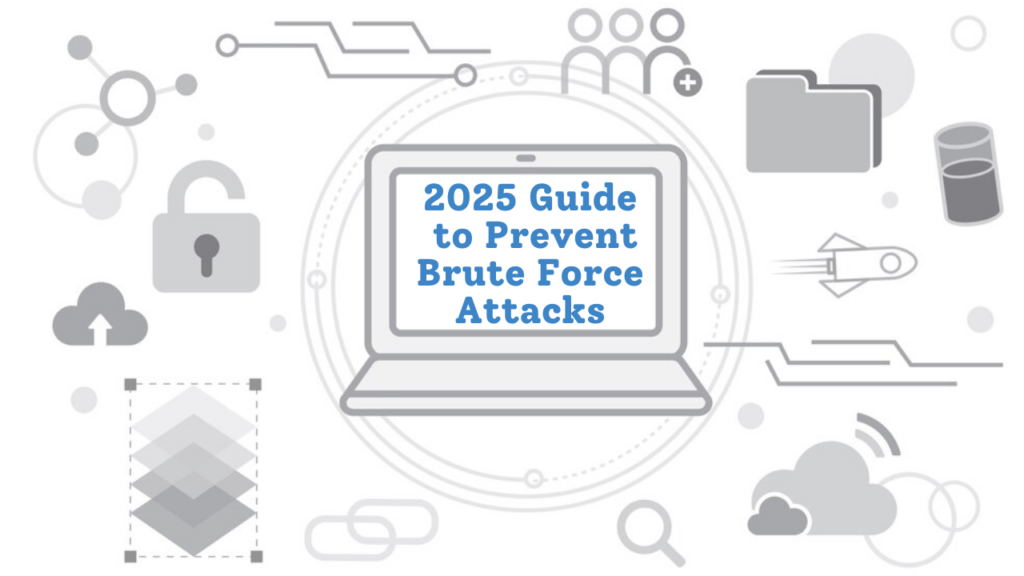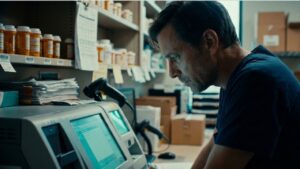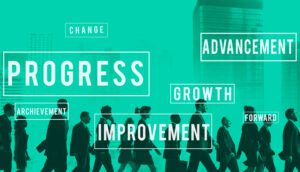
Are you vulnerable to brute force attacks in 2025? With the rise of cybercrime, these attacks continue to be a significant threat.
According to the 2021 Verizon Data Breach Investigations Report, a staggering 80% of breaches involved brute force attacks or stolen credentials.
What is a brute force attack? It’s when cybercriminals use brute force software and password-cracking tools to gain unauthorized access by attempting countless password combinations. Whether you’re an individual or an organization, it’s crucial to protect your accounts with strong defenses to prevent falling victim to these attacks.
As Bruce Schneier, a renowned security technologist, once said, “Security is a process, not a product.”
How Do Brute Force Attacks Work?
A brute force attack occurs when a cybercriminal systematically attempts every possible combination of characters to guess a password or encryption key. But how do attackers manage to break even the most complex passwords?
By leveraging powerful brute force software, they can target these passwords, cracking them one by one. These attacks rely on sheer computational power, trying every potential combination until the correct one is found.
Common Tactics Used in Brute Force Attacks:
Attackers employ several methods to crack passwords and gain unauthorized access. These are some of the most common tactics used in brute force attacks:
- Simple Brute Force: Attackers try every possible password combination, which can be time-consuming, especially with complex passwords.
- Dictionary Attacks: Attackers use common words, phrases, or passwords from a pre-built list, speeding up the attack process.
- Hybrid Attacks: A combination of dictionary and brute force techniques, often adding common numbers or symbols to words.
- Reverse Brute Force Attacks: Attackers use a known password and attempt it across a large number of different accounts, hoping to find one where it is used.
Why These Attacks Are Still a Major Threat in the Digital Age:
| Factor | Impact |
|---|---|
| Increased Processing Power | Modern computers and botnets can perform millions of password guesses per second. |
| Weak Password Habits | Many users still rely on simple or repetitive passwords, making them easy targets. |
| Automation and Botnets | Attackers can automate attacks with vast networks of compromised devices, speeding up the process. |
| Lack of Multi-Factor Authentication (MFA) | Without MFA, brute force attacks have a higher chance of success, especially with weak passwords. |
| Advancement of Cracking Tools | New and improved password-cracking programs can break even complex passwords faster than before. |
Despite advancements in cybersecurity, brute force attacks remain a persistent threat due to these factors, making it crucial to implement stronger password policies and additional security layers.
At CCI Training Center Center, we help you develop the skills and knowledge needed to defend against these evolving threats and secure your digital systems effectively.
Defending Against Brute-Force Password Attacks
Are Your Passwords Strong Enough to Withstand Brute-Force Attacks?
In 2023, U.S. federal agencies reported a 9.9% increase in cybersecurity incidents, totaling 32,211 breaches.
Among these, brute-force attacks remain a significant threat, with cybercriminals leveraging advanced brute force software to systematically guess passwords.
So, how can one defend against brute-force password attacks? Implementing strong, unique passwords, enabling multi-factor authentication (MFA), and using tools like password managers can significantly reduce the risk of successful attacks.
Essential Strategies for Protecting Against Brute-Force Attacks:
To effectively defend against brute-force attacks, implementing the right strategies is crucial. Here are some key measures:
- Account Lockout Policies: Temporarily lock accounts after several failed attempts to thwart automated attacks.
- Enable Multi-Factor Authentication (MFA): Add an extra layer of defense by requiring more than just a password.
- Monitor Login Attempts: Keep track of login patterns to quickly detect suspicious activity.
- Rate-Limiting: Limit the number of login attempts in a set time frame to slow down brute-force attacks.
At CCI Training Center, we teach you how to implement these strategies effectively, ensuring that your systems are well-protected from brute force attack in cyber security threats.
Best Practices for Password Creation and Management:
Creating strong, secure passwords is the first line of defense. Here are some best practices to follow:
- Use Complex, Unique Passwords: Avoid common phrases and create passwords with a mix of characters, numbers, and symbols.
- Change Passwords Regularly: Force periodic password updates to limit exposure.
- Stop Reusing Passwords: Ensure each account has a unique password to prevent cross-platform breaches.
- Use Password Managers: Use tools to generate and store complex passwords securely, reducing the likelihood of weak passwords.
The Critical Role of Multi-Factor Authentication (MFA) and Additional Defenses
Multi-Factor Authentication (MFA) is a powerful defense against brute-force attacks. But how can you ensure that your accounts are fully protected from password cracking tools?
Even if an attacker guesses a password, MFA requires an additional verification step, like a code sent to the user’s phone or an authentication app, adding a crucial layer of security.
| Defense | Description |
|---|---|
| Multi-Factor Authentication (MFA) | Adds an extra layer of security by requiring more than just a password (e.g., text codes or authentication apps). |
| Account Lockout Policies | Temporarily locks accounts after a certain number of failed login attempts, preventing automated attacks. |
| Rate-Limiting | Restricts the number of login attempts within a certain period, slowing down brute force attacks. |
| Behavioral Analytics | Monitors user behavior and detects anomalies that could indicate an ongoing brute-force attack or other malicious activity. |
| Encryption of Passwords | Ensures stored passwords are encrypted, even if an attacker gains access to the data. |
At CCI Training Center, we prepare you with the knowledge and tools necessary to implement these defenses, ensuring you’re equipped to protect your digital assets from the ever-growing threat of brute-force attacks.
How Does a Brute Force Attack Work in Cybersecurity?
A brute force attack starts with targeting weak or easily guessable passwords. But how do attackers manage to break through even strong passwords?
Attackers use brute force software to systematically try every possible combination, from simple to complex, until the correct one is found. Despite advancements in security, the simplicity and power of this method make it a constant threat in 2025.
Common Tools Attackers Use to Automate Brute Force Attacks:
- Hydra: A fast and flexible password cracking tool used for attacking remote services.
- John the Ripper: A powerful tool that can crack a variety of encrypted password types.
- Burp Suite: A popular web application testing tool that includes automated brute force capabilities.
Why It’s Still a Prevalent Method of Hacking in 2025:
Despite advancements in cybersecurity, brute force attacks remain a preferred method for hackers due to several factors:
- Weak Passwords: Many users still rely on simple, common passwords, making them easy targets for brute force software.
- Accessibility of Brute Force Software: With readily available tools, attackers can automate and speed up the cracking process.
- Lack of Strong Defenses: Many systems still lack essential protections like multi-factor authentication (MFA), leaving them vulnerable to brute force attempts.
As Bruce Schneier, a security expert, wisely put it, “Security is a process, not a product.” In 2025, it’s more crucial than ever to implement ongoing security measures to stay ahead of evolving threats.
According to the Cybersecurity & Infrastructure Security Agency (CISA), the number of cyber incidents reported by critical infrastructure sectors has been rising, highlighting the ongoing threat of brute force attacks.
Real-World Examples of Brute Force Attacks
Famous Breaches Caused by Brute Force Attacks:
- Microsoft RDP Attacks: During the COVID-19 pandemic, there was a significant increase in brute force attacks targeting Microsoft’s Remote Desktop Protocol (RDP) systems. Attackers exploited weak passwords to gain unauthorized access to systems, highlighting the vulnerabilities in remote access configurations.
- U.S. Electric Sector Vulnerabilities: A comprehensive analysis of the U.S. electric sector revealed that brute force attacks were among the methods used to compromise critical infrastructure organizations. These attacks exploited weak credentials, underscoring the need for robust cybersecurity measures in the energy sector.
- Volkswagen Group: In 2015, Volkswagen faced a significant cybersecurity incident involving unauthorized access to their internal systems. While the exact method was not publicly disclosed, the breach underscored the importance of robust password policies and system security measures.
Lessons Learned and Shaped Defenses:
These incidents have underscored the critical need for:
- Strong Password Policies: Implementing complex, unique passwords to resist brute force attempts.
- Multi-Factor Authentication (MFA): Adding an extra layer of security to prevent unauthorized access.
- Regular Security Audits: Continuously assessing and strengthening security measures to identify and mitigate vulnerabilities.
Impact on Businesses and Individuals:
Brute force attacks can lead to:
| Impact | Description |
|---|---|
| Data Breaches | Unauthorized access to sensitive information, resulting in data theft. |
| Financial Losses | Costs associated with breach mitigation, legal fees, and potential fines. |
| Reputation Damage | Loss of customer trust and potential business opportunities. |
Implementing robust cybersecurity measures is essential to protect against these evolving threats.
Unlike dictionary attacks, which rely on common passwords from pre-built lists, brute force attacks target every possible password combination until the correct one is found. Phishing, however, bypasses the need for guessing passwords by manipulating users into revealing their login credentials directly.
The key difference?
Brute force attacks are driven purely by computational power, while the others depend on exploiting human behavior or existing password weaknesses.
Why Are Brute Force Attacks Harder to Stop?
Brute force attacks don’t depend on the victim’s actions—they’re fully automated, relentless, and scalable. Here’s why they pose a serious challenge:
| Challenge | Why It’s Hard to Stop |
|---|---|
| Automation | Brute force software can continuously try millions of combinations. |
| Password Strength | Weak passwords make it easier for attackers to succeed. |
| Lack of Advanced Defenses | Systems without MFA or account lockout policies are more vulnerable. |
The Hidden Dangers of Weak Passwords:
The weak password epidemic is the backbone of brute force attacks. Without complex, unique passwords, systems are sitting ducks. Attackers can use password cracker programs and brute force software to break these weak defenses in minutes. Protecting against brute force attacks starts with crafting strong passwords:
- Avoid common phrases and simple combinations.
- Use a mix of uppercase, lowercase, numbers, and symbols.
- Enable multi-factor authentication (MFA) to add a vital second layer of security.
Key Techniques to Protect Against Brute Force Attacks
To effectively protect your systems from brute force attacks, consider implementing the following strategies:
1. Enhance Password Policies:
- Enforce passwords that are long, complex, and unique.
- Require a combination of uppercase, lowercase, numbers, and special characters to increase password strength.
- Mandate regular password rotation to reduce the impact of stolen credentials.
2. Implement Rate Limiting and Account Lockouts:
- Set a limit on the number of login attempts to slow down attackers.
- Lock accounts temporarily after a set number of failed login attempts, or require additional verification steps.
3. Deploy CAPTCHA and Honeypots:
- Use CAPTCHA challenges to block automated login attempts.
- Set up honeypots—fake accounts designed to attract malicious traffic and trap attackers.
4. Enforce Encrypted Password Storage:
- Always store passwords in an encrypted format to protect them from theft.
- Use modern encryption algorithms to ensure that even if data is breached, passwords remain secure.
5. Monitor and Analyze Login Behavior:
- Use behavioral analytics to identify abnormal login patterns that may indicate an ongoing brute force attack.
- Set up alerts to notify administrators of suspicious login attempts or unusual locations.
These techniques form a multi-layered defense against brute force attacks, making it significantly harder for attackers to gain unauthorized access.
Brute Force Attack Prevention: What Works?
To effectively prevent brute force attacks, advanced technologies and proactive measures are essential.
But how can you stay ahead of increasingly sophisticated attackers?
AI-driven detection systems, which analyze login patterns in real-time, can quickly identify suspicious activity. Combined with bot protection, these systems block automated attacks before they escalate.
Continuous monitoring further enhances defense by spotting unusual login patterns early, while leveraging proactive threat intelligence helps predict and mitigate evolving risks.
According to a 2018 alert from the Cybersecurity and Infrastructure Security Agency (CISA), cyber actors increasingly use brute force attacks like password spraying against organizations worldwide.
| Prevention Techniques | Benefits |
|---|---|
| AI-Driven Detection | Fast identification of suspicious login attempts. |
| Bot Protection | Prevents automated attacks from progressing. |
| Continuous Monitoring | Ensures early detection of potential threats. |
| Proactive Threat Intelligence | Predicts and mitigates attacks before they happen. |
Conclusion
As brute force attacks continue to grow in sophistication, protecting against them is more critical than ever in 2025. Cybersecurity professionals must stay vigilant and well-trained to defend against evolving threats. CCI Training Center equips you with the skills and hands-on experience necessary to protect your systems from brute force and other cyber threats, ensuring you stay ahead in the fast-paced world of cybersecurity.
Ready to take the next step in your cybersecurity career? Join the CCI Training Center cybersecurity program today and gain the expertise to defend against the most pressing cyber threats of 2025.
Program Offered
- Pharmacy Technician Training
- Online Medical Assistant
- Medical Billing and Coding Specialist Program
- Cloud Computing Technician Training
- Computer Network Technician
- Business and Accounting
- Radiology Technician Training
- Medical Assistant Program
- Computer Support Technician
- Cybersecurity Program
- Virtual Assistant Training

This article is written by
Share this article
Program Offered
- Pharmacy Technician Training
- Online Medical Assistant
- Medical Billing and Coding Specialist Program
- Cloud Computing Technician Training
- Computer Network Technician
- Business and Accounting
- Radiology Technician Training
- Medical Assistant Program
- Computer Support Technician
- Cybersecurity Program
- Virtual Assistant Training

This article is written by
Share this article
Frequently Asked Questions FAQ's
Can a brute force attack be entirely prevented?
While complete prevention is impossible, CCI Training Center helps you implement strong passwords, MFA, and monitoring to minimize the risk.
How long does it take for a brute force attack to succeed?
It depends on the password complexity and security measures. With CCI Training Center, you’ll learn how to strengthen passwords to resist attacks.
What should you do if you’re the victim of a brute force attack?
Reset passwords immediately, enable MFA, and assess vulnerabilities. CCI Training Center prepares you to respond quickly and strengthen defenses.
How can multi-factor authentication (MFA) stop brute force attacks?
MFA adds an extra layer of security, making it much harder for attackers to gain access. CCI Training Center teaches you to implement this vital defense.
Are there any specific industries that are more vulnerable to brute force attacks?
Healthcare, finance, and government sectors are particularly vulnerable due to sensitive data. CCI Training Center equips you to secure these industries.
Related Articles






CCI Training Center Proudly Completes
41 Years in Career Training Services












